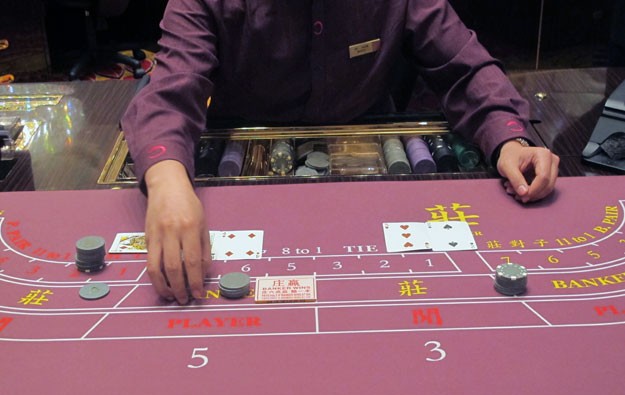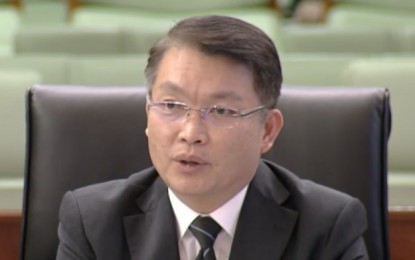New Macau junkets should pledge more capital: group
Apr 15, 2016 Newsdesk Latest News, Macau, Top of the deck

The head of the largest association of Macau VIP gaming promoters has confirmed to GGRAsia it is in talks with the local gaming regulator about the possibility of increasing by 100 times the amount of capital deposit that any newly-registered VIP promoters must lodge with the authorities.
If the idea were adopted, it would raise the required deposit to MOP10 million (US$1.3 million), from the current MOP100,000 level set in 2004.
“Our association has proposed to the government to raise the capital requirements for new VIP gaming promoters to MOP10 million, and to have at least one Macau resident as a shareholder,” said Kwok Chi Chung, president of the Association of Gaming and Entertainment Promoters, in comments to GGRAsia.
Mr Kwok was referring to talks with the city’s casino regulator, the Gaming Inspection and Coordination Bureau – also known as DICJ. Bloomberg News on Thursday reported that the Macau gaming regulator was working with junket operators on a proposal to tighten operations for new entrants.
“Because the current requirement at MOP100,000 is too low,” noted Mr Kwok, “this capital requirement is not proportional to what the entrants should have for their operation[al] scale.”
GGRAsia approached the gaming bureau for comment on the issue, but did not receive a reply by the time this story went online.
“We don’t think the existing 141 licensed gaming promoters would be affected by our suggested new rule, if it’s really adopted by the government,” Mr Kwok told us. “What we proposed is that the rule is only to be applied on new entrants in the industry.”
Even if such a rule change were applied to the whole Macau junket sector, it would be unlikely to have a significant impact on the local industry’s earnings, noted Richard Huang, an analyst at Japanese brokerage Nomura, in an email to GGRAsia.
“The impact to the larger junkets like Suncity – which are cash-rich – is [likely to be] small, but smaller-sized junkets might be affected,” Mr Huang said.
He added: “There is no actual definition of small junkets but normally we [use the term to] refer to those that do not have a fixed room in the major casinos.”
“Those small junkets would only be contributing 1 percent to 2 percent of industry earnings,” Mr Huang added.
Nonetheless, further junket supervision “can be incrementally negative for the sector, which continues to suffer from liquidity constraints, increased oversight, and other well documented operating pressures,” Daiwa Securities Group Inc analysts Jamie Soo, Adrian Chan and Jennifer Wu wrote in a report issued on Thursday.
Closer scrutiny
In October last year, the gaming bureau announced that from this year Macau junket operators would be subject to stricter accounting rules, including a requirement to compile monthly accounting reports.
Paulo Martins Chan, a former assistant public prosecutor-general in Macau who became the director of the DICJ late last year, said in a speech on December 1 that the local gaming industry needed “an improved legal framework”.
In January the gaming bureau said the number of registered junkets had fallen by 23 percent over a 12-month period. In the 12 months to December 31, VIP casino GGR fell nearly 40 percent year-on-year, weighed down, said analysts, by China’s anti-graft campaign and a slowing Chinese economy.
Several analysts have more recently mentioned an improvement in liquidity in mainland China’s real estate market, which could feed into improved junket play some months down the line. Some VIP players settle their credit-based gambling losses by selling real estate, say the analysts.
Junket association head Mr Kwok this week told GGRAsia that his group had also suggested to the casino regulator the creation of a blacklist that the association members could use to identify people with bad debts relating to VIP gambling credit issued in Macau.
“Basically the government has agreed that the blacklist issue can be studied,” Mr Kwok said, “But we still have not worked out the details of how to make the blacklist work.”
In a reply to GGRAsia on the blacklist issue, DICJ stated: “Regarding the creation of a credit debtor [data]base, the bureau is now studying the issue, so at this stage it is not convenient to disclose the details.”
In a previous interview with GGRAsia, Mr Kwok had mentioned that his association in 2014 piloted a gaming debtor database exclusively for the use of its members. But the trade body said the sharing of such information was discontinued soon after the database was launched, due to compliance issues relating to Macau’s Personal Data Protection Law.
(Updated at 3.08pm, April 15)
Related articles
-
 Wynn Macau debt down amid slower 3Q...
Wynn Macau debt down amid slower 3Q...Nov 07, 2024
-
 Macau to continue solid economic...
Macau to continue solid economic...Oct 30, 2024
More news
-
 Macau to get 36mln visitors in 2025:...
Macau to get 36mln visitors in 2025:...Nov 21, 2024
-
 EBITDA a focus in Macau market share...
EBITDA a focus in Macau market share...Nov 21, 2024
Latest News
Nov 21, 2024
Macau’s 2025 visitor tally could reach 36 million, or a circa 9-percent gain on this year’s projected 33 million. So said Lei Wai Nong (pictured in a file photo), the city’s Secretary for...Sign up to our FREE Newsletter
 (Click here for more)
(Click here for more)
Pick of the Day
”[Baccarat side bets in Macau] are becoming more popular amongst players, based on what we observed when we conducted our [monthly premium mass] table surveys”
George Choi and Timothy Chau
Analysts at Citigroup
Most Popular
 Gaming technology firm IGT reports hacking incident November 21, 2024
Gaming technology firm IGT reports hacking incident November 21, 2024  US$30bln 2025 GGR target achievable for Macau: CE November 19, 2024
US$30bln 2025 GGR target achievable for Macau: CE November 19, 2024  Marina Bay Sands projects 40pct EBITDA leap post extension November 20, 2024
Marina Bay Sands projects 40pct EBITDA leap post extension November 20, 2024  Macau big-event outdoor venue gets trial run Dec 28: CE November 20, 2024
Macau big-event outdoor venue gets trial run Dec 28: CE November 20, 2024  Future of gaming is the online format: Pagcor chairman November 20, 2024
Future of gaming is the online format: Pagcor chairman November 20, 2024









